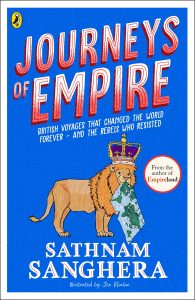A rebellious pirate queen who sailed the seas on her perilous adventures, the tragic true story of Pocahontas and Mahatma Gandhi’s extraordinary Salt March – these are just some of the intriguing tales that make up Journeys of Empire.
London-based author Sathnam Sanghera has chosen 10 complex historical figures for his new book, published this month, to capture the “massive” expanse of the British Empire. After all, it covered a quarter of the planet’s land surface at its height in 1923 and, in the words of the author, it was “massive” and “the biggest thing we ever did as a country”.
As the book’s tagline explains, he has chosen to tell this story through the ‘British voyages that changed the world forever – and the rebels who resisted’. This monumental set of complicated journeys have been distilled for children aged between nine and 12 to cannily sweep across decades of history to capture events that continue to shape our world today.
“One of the things I wanted to get was a sense of the geography of the Empire,” said Sanghera, explaining the tough choice of picking just 10 journeys out of countless options.
“There’s a lot of concentration on India, obviously, but we sometimes forget that countries like America and Ireland were also part of the British Empire. So, I’ve got Olaudah Equiano from Nigeria, Joseph Banks and Captain Cook in Australia, Gráinne O’Malley in Ireland, we’ve got Pocahontas from North America and David Livingstone in Africa, among others who give a good sense of the geography of the British Empire,” he said.
For his second children’s book after Stolen History: The truth about the British Empire and how it shaped us, Sanghera chose to retrace the footsteps of some these historical figures as an effective means of capturing the complexities involved when covering a subject as weighty as British imperialism.

Image: Penguin Books
“The interesting thing for me is how there aren’t clear lessons from any of the stories because each of the individuals is complicated. For instance, in the chapter on Gandhi and the Salt March (1930), we have an incredibly inspiring man with a statue up in Parliament Square in London. But also, he did go through a phase of his life in South Africa when he expressed quite a lot of racism. So, in that way, he was a contradictory figure,” reflects the author.
“And similarly, there’s a whole chapter on the Royal Family in this book. Queen Victoria was obviously the Empress of India and believed in the might of the British Empire, but equally, she did, at times, speak up for the indigenous. She spoke up for the Indian mutineers (1857) and how they were being treated… so she’s a very contradictory figure too.”
The result is a set of very engaging and contradictory stories of individuals that Sanghera hopes will resonate with kids as they dive into the book, which is aimed at filling in the gap in the way the subject is barely taught in schools in Britain.
“If I’d known this stuff as a kid, it would have changed my entire sense of being a British Indian. I sat through so many Remembrance Day services as a kid and it didn’t occur to my teachers to ever mention that Indians were there too, fighting in World War I and World War II. Just knowing that would have been so powerful,” notes Sanghera, born in Wolverhampton to Punjabi immigrant parents.
This historical contextualising is also often missing in contemporary debates, including around migration.
“There’s a reason my parents came. There’s a reason why millions of people from Nigeria, South Africa, came here. It’s because they were part of the British Empire. This is a central fact that is very rarely mentioned in the so-called debate about migration in Britain. Britain is seen purely as a soft touch for migrants. The historical context is very rarely explained,” he reflects.
As he writes in his new book, we need to understand and talk about the Empire because it explains a lot of things about the world and Britain.
“It explains how entire countries like Nigeria and Pakistan came into existence. It explains why many British charities do so much work abroad. It explains some of the racism we see around the world. It explains why Jamaicans eat breadfruit and why Indians drink so much tea. And it partly explains why so many people speak English across the planet.”
As the author of bestsellers ‘Empireland’ and ‘Empireworld’, presenting some of this perspective to children during his many talks in schools has been an aspect of his work that he finds very rewarding.
“Writing to educate and changing kids’ entire sense of who they are and their position in Britain is really important work, especially with the rise of far-right politics. It’s incredibly important and the most rewarding thing.
“When you talk to kids, you try to connect the history to their lives. They are surprised by how much about their lives actually can be explained by Empire. I mean, the tea they drink, the language they speak, the sports, cricket, football spread around the world – these things would not be global sports if it were not for the British Empire.”
While they are often quite surprised at how relevant this history is to their daily lives, Sanghera has found that children tend to be more receptive than their parents sometimes.
“There’s been a lot of trolling, certain amount of death threats. It’s not a fun thing to talk about, especially as our politics gets more and more right wing nowadays,” he shares.
Amid this “profoundly depressing” scenario of unfolding world events, there is hope that his children’s books can help young minds critically evaluate information and draw their own sensible conclusions.
“My mission is not to create an army of students who agree with me… what my aim is to give kids a mind of their own, to give them the skills to critically evaluate the information that’s being put in front of them: whether it’s claims about history, whether it’s nonsense on social media, whether it’s their politicians feeding them narratives and lies.”
He hopes that education will eventually help them sift fact from fiction and work out when they are being lied to: “That is the ultimate mission!”
After four books on the subject, the 48-year-old journalist-author is ready to move away from the British Empire to focus on the popstar George Michael as 2026 will mark 10 years since the death of the singer-songwriter.
“I’m writing a re-evaluation of him. Although there is a link to the British Empire, because his father was Greek Cypriot and Cyprus was famously ruled by the British. One of the main reasons George Michael ended up in Britain is because the island was partitioned.
“So, he fulfils my fundamental thesis, which is that you cannot escape the legacy of the British Empire. It’s absolutely everywhere you look.”
‘Journeys of Empire: British voyages that changed the world forever – and the rebels who resisted’, published by Puffin Books, released in the UK on 11 September 2025.




